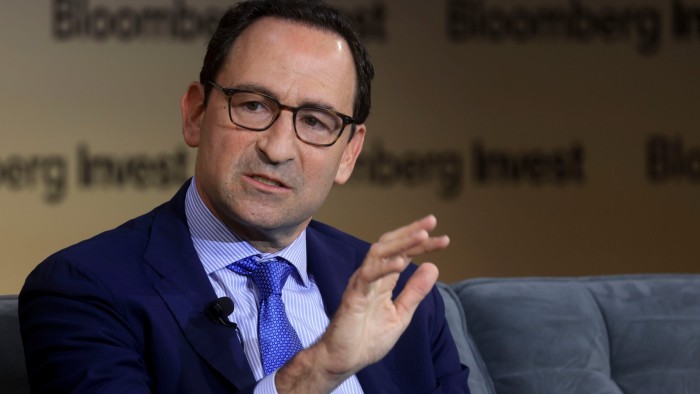Unlock the Editor’s Digest for free
Roula Khalaf, Editor of the FT, selects her favourite stories in this weekly newsletter.
Blackstone president Jonathan Gray has warned that the US economy faces the risk of a recession unless Donald Trump can rapidly strike trade deals, becoming the latest Wall Street boss to ratchet up pressure on the administration.
The US president last week announced a 90-day suspension of the steep tariffs the White House had imposed on most of America’s trading partners, paving the way for negotiations with dozens of countries.
Gray, who oversees the day-to-day operations of the investment group, said: “I would expect an economic slowdown. How significant the economic slowdown is will be directly correlated to the length of the tariff diplomacy.”
He added: “The recession risk is directly tied to the length of the uncertainty”, saying that a speedy resolution to the trade talks would be “positive for the economy and markets”.
Blackstone chief executive Stephen Schwarzman said uncertainty about tariffs had “dramatically impacted investor sentiment” negatively. “We believe that fast resolution is critical to mitigate risks and keep the economy on the growth path,” he said on a call with analysts.
Trump’s climbdown came after the aggressive duties unleashed days of market turmoil. The US president, who has said that more than 70 countries are lining up to negotiate trade agreements, held talks with Japanese officials over a potential deal this week.
The comments from Gray and Schwarzman came after JPMorgan Chase chief executive Jamie Dimon said he hoped the White House would soon reach “agreements in principle” with the US’s trading partners.
Stock and bond markets have stabilised since the US tariff pause, but the White House has increased duties on China and also kept a baseline 10 per cent levy on imports from all countries.
Gray said the ructions in markets had created investment opportunities for Blackstone, which has $1.2tn in assets.
“[You] have to anticipate that we are in a period of heightened volatility and uncertainty, but in some cases, we are seeing prices start to reflect that and it can create opportunities for us to invest,” he said.
Blackstone on Thursday reported first-quarter results that beat Wall Street expectations, with its distributable earnings — a metric favoured by analysts as a proxy for cash flow — rising 11 per cent to $1.4bn.
The company raised $62bn from investors in the quarter, its biggest haul in almost three years, with its credit and insurance business attracting $30bn.
Blackstone also raised $11bn for its funds from wealthy individual investors. About a quarter of the group’s total assets are now managed on behalf of individual investors, up from almost nothing a decade ago.
This month Blackstone announced a plan with Vanguard and Wellington Management to create funds that will invest in public and private assets and cater to affluent investors. Blackstone is betting this business cohort will help drive growth.
Both Gray and Schwarzman said that Blackstone was likely to hold back from selling businesses in tougher financial markets, something that would slow its performance fee earnings.
“More volatile markets do mean we are less likely to sell in the near term,” Schwarzman said on the call.



